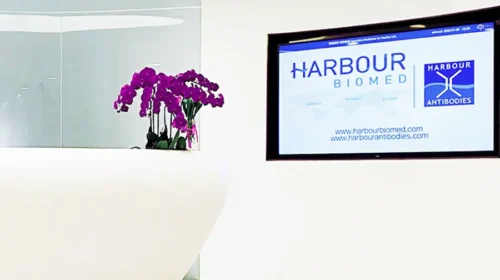Cash-strapped Viva Biotech sells stake and plans spinoff

The biotech has gained a capital injection from Temasek and a major Chinese investor, but the deal has not boosted investor confidence
Key Takeaways:
- As well as tapping strategic investors, Viva Biotech is planning to list its drug research subsidiary on a Chinese exchange by the end of 2026
- A sinking share price has piled pressure on the company to buy back its convertible bonds, hence the need for funds
By Molly Wen
Pharmaceutical services company Viva Biotech Holdings (1873.HK) has been suffering from a bad financial headache, but strategic investors have just stepped in with some pain relief.
Last Sunday the biotech announced it had transferred a 24.21% stake in its drug research subsidiary, Viva Shanghai, to Singapore’s Temasek and China’s Jiangsu Honghui Private Equity Management to raise funds of nearly 1.06 billion yuan ($148.26 million).
Viva Biotech needs the money to buy back a heap of its convertible bonds. The heavily indebted company is under pressure to redeem the bonds early after its share price tumbled over the past two years, with little prospect of a recovery in a weak Hong Kong stock market.
For the equity transfer, Viva Shanghai was valued at about 4.39 billion yuan, but on the day of the announcement the parent company was worth a mere HK$3.7 billion ($473 million yuan) on the Hong Kong market.
Viva Biotech provides outsourced drug discovery for customers through its contract research organization (CRO) business. It also acts as a contract development and manufacturing organization (CDMO) and can provide commercialization services for the pharmaceutical industry.
Last year, its operating revenue was 2.38 billion yuan, with an adjusted net loss of 134 million yuan. Looking more closely at the earnings, the revenue from the CRO business rose nearly 21% to 895 million yuan from a year earlier, with profit after tax of 200 million yuan. Income from CDMO and commercialization services came mainly from Longhua Pharmaceuticals, a business acquired in 2021 that contributed 1.48 billion yuan in revenue last year, up 8.9% year over year.
Given that the CRO business accounts for about 40% of total revenue, Viva Shanghai was granted a high valuation premium in the equity transfer deal.
But investors could stand to gain in the long run. According to the agreement, Viva Biotech will restructure its operations to transfer the total assets and personnel from its CRO business to Viva Shanghai. It also commits to listing the CRO firm on a mainland exchange by the end of 2026. In that case, the hived-off company could be worth more at the time of listing. If the listing plan falls through, the parent company has promised that Viva Shanghai will be sold off for at least 1.5 times its valuation after this latest fundraising.
However, the capital injection and spinoff plan failed to ease investor worries. On the first trading day after the news, Viva Biotech’s share price plunged 13.2%, and it edged lower for two more days. The share has fallen more than 60% from its 2019 listing price of HK$4.41 and is down more than 90% from a high of HK$11.64 reached in June 2021.
In addition to the equity transfer, Viva Biotech also issued 5.85 million new shares with a total valuation of HK$117 million, and another HK$470 million in convertible bonds, equivalent to 12.14% of its outstanding shares, with an initial conversion price of HK$2 per share. Investors concerned by equity dilution during a bear market may well decide to sell the stock.
Deeply in debt
In 2020, Viva Biotech had issued $180 million in convertible bonds, completed HK$1.05 billion in financing and issued another $280 million worth of convertible bonds. Flush with cash, the company expanded rapidly. In 2020 alone, it spent 700 million yuan to buy land in Hangzhou to build a laboratory. It also bought 80% of Longhua Pharmaceuticals for 2.56 billion yuan, and acquired SYNthesis, a small molecule drug discovery company, for 620 million yuan. The acquisitions turbocharged its business, driving a 202% revenue surge in 2021 to 2.1 billion yuan.
But the stellar growth was short-lived, as Viva Biotech’s revenue growth plummeted to 13.1% last year. The company went from posting an adjusted profit of 321 million yuan in 2021 to making an adjusted loss of 134 million yuan last year. The company blamed the drop on staffing issues caused by Covid outbreaks, but high borrowing costs also ate into its profits.
The company’s financial costs last year were 185 million yuan, mainly from interest payments on convertible bonds and lease liabilities or interest expenses on bank loans. As Viva Biotech’s shares keep tumbling, the gap between the market price and the conversion rate stipulated in the bond contracts continues to widen. Unwilling to convert their bonds into shares, investors instead have been pressing the company for early redemption. Since July last year, Viva Biotech has been carrying out successive buybacks of its convertible bonds. By this February, it had fully redeemed US$180 million worth of the bonds.
Moreover, Viva Biotech is strapped for cash. As of the end of last year, it held cash and cash equivalents of 679 million yuan, but its liabilities reached 2.67 billion yuan, including the debt portion of the convertible bonds valued at 1.51 billion yuan. Therefore, the 1.06 billion yuan raised from the stake sale will be used entirely to redeem convertible bonds, at 103.08% of the face value plus unpaid interest.
Investment losses
In the biotech industry, CROs can be paid directly for their services or can take equity stakes in their client companies to share in future profits. The latter model, known as Equity-for-Service, was adopted by Viva Biotech. Last year, the company invested in four new startups and two new investment funds, as well as nine companies under incubation. It has so far invested in a total of 91 startups.
With the global biopharmaceutical industry under pressure, Viva Biotech reported a fair value loss on financial assets totaling 364 million yuan last year. The company said it was actively applying for a fund manager license in China, looking to explore incubation funds as a way to ease cash flow pressure.
As for the long-term outlook, Viva Biotech’s order book at the end of last year was about 1.05 billion yuan, an 8.8% rise from a year earlier. With stable cash flow once the bonds problem has been resolved, the prospects look promising. Based on last year’s revenue, Viva Biotech’s price-to-sales (P/S) ratio is only 1.3 times, while its counterpart Joinn Laboratories (China) Co., Ltd. (6127.HK; 603127.SH), which also runs CRO and CDMO businesses, has a price-to-sales (P/S) ratio of 4.6 times. Joinn’s revenue last year was slightly lower than Viva Biotech’s, but the company made a net profit of 1.07 billion yuan, indicating better financial health.
Viva Biotech may have to wait for the spinoff and listing of Viva Shanghai before it can fully recover from its financial woes and persuade investors to revive its share price.
To subscribe to Bamboo Works weekly free newsletter, click here






